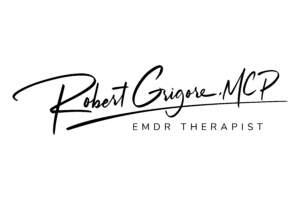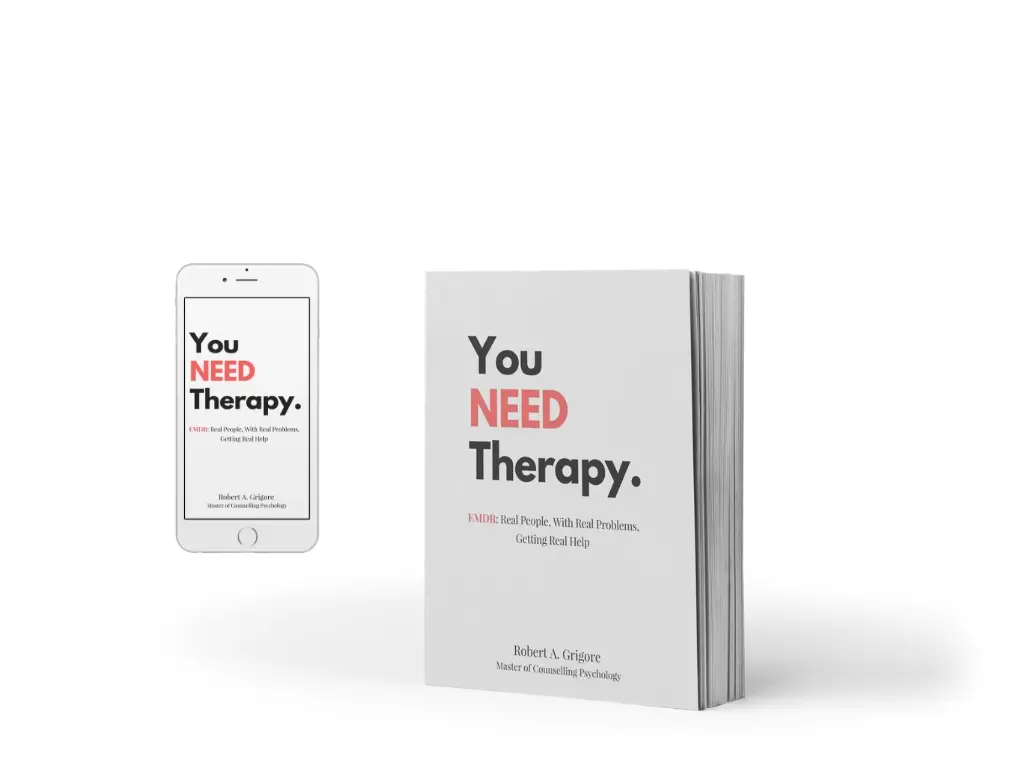Yup, you heard me. I know you NEED therapy. But how do I know that? Simple. We all do. I don’t just mean some pie-in-the-sky “we all need to get along and be happy” nonsense; I mean that literally every human being is in need of deep therapeutic change. Without it, we are doomed to stay stuck, and not evolve as individuals.
The reason I can be so certain that we all NEED therapy, is the exact reason why I wrote the book, “You NEED Therapy. EMDR: Real People, With Real Problems, Getting Real Help.” After working in the field of psychotherapy for a relatively short period of time (approximately four years at the start of my book), I recognized that my growing suspicion was true: we are all wounded beings. However, it was only after adopting the disciplined psychotherapeutic approach of Eye Movement Desensitization and Reprocessing (EMDR), and subsequently dedicating my life to healing trauma, did I realize that my suspicion was actually much more serious than I thought…
While the Mental Health Commission of Canada stated in 2016 that one in five Canadians (that’s 6.7 million people) experienced a mental health disorder or complaint, I would argue that the number is actually much higher. This is only people who have actually in some way recorded their distress, either via public health records or through some kind of survey. How about all the people who didn’t seek help, or tell anybody about it? How about all those who suffer in silence, gritting their teeth, day-in and day-out, just hanging on until they get to some kind of relief…like making it to the weekend, or if they’re lucky enough, going on a vacation?
What’s actually more serious, and why I wrote the book You NEED Therapy. (and why I’m writing this blog post), is that I am rather certain that you are not an anomaly, and that you (just like I do), NEED therapy. If you do not take this acknowledgment seriously, I fear that you will continue to live your life repeating old patterns that are not allowing you to progress in your life–they keep you stuck, living chained to past ideologies and imprisoned in pain. These past negative ideologies (what we call in the EMDR world as “Negative Cognitions” or “Negative Beliefs”) keep you perhaps feelings “safe,” but they do not promote you to grow–they keep you stuck. I touch a little bit more about these in a bit.
As an EMDRIA-Approved Certified EMDR Therapist, I can tell you that everybody you come across is experiencing some sort of emotional and/or psychological distress–they just might hide it better than others. To qualify as someone who “experiences mental health distress,” you simply need to experience difficulties in some manner in your life: maybe you notice feeling anxious in social situations, during conflict with your spouse, or thinking about dating, or maybe you notice that you’ve been feeling really tired, drained, stressed out, and have had a lower mood lately; or maybe it’s something where you know that you’ve experienced a traumatic incident and you haven’t been the same since (etc.). Just because you may not be suffering from uncontrollable nightmares, delusions, or find yourself banging your head against the wall, doesn’t mean that you’re not suffering. If you are experiencing nightmares, and banging your head against the wall, hopefully that’s a sign that you should call me 😉
In my book You NEED Therapy. EMDR: Real People, With Real Problems, Getting Real Help, I expose the truth about trauma: that everyone has experienced a trauma–you included. In fact, I’m quite certain that you’ve experienced several traumas. Unfortunately for many, if the trauma they experienced isn’t “severe enough” (like a car accident or a terrorist bombing), they don’t think they are a trauma-survivor. That’s simply not true. We are all trauma survivors.
Trauma can occur at any time in your life. It needn’t be that you survived a hurricane, or assault, it can be much more subtle than that. For example: if you grew up in a family atmosphere where you were constantly made to feel insignificant, small, or unimportant; or perhaps your family moved around a lot; or maybe you were bullied on the school yard; or it was difficult to have your voice heard among your friends; over time, these “smaller traumas” fester and grow into negative beliefs. A negative belief is a quiet voice that you hear in the “back of your mind” that makes comments about yourself, and for which actually feel true to you. I’m not talking about auditory hallucinations–most of us don’t actually hear the voice, but if you do, that’s OK too. As an example, following the order of the example of what could constitute as “smaller traumas”, the corresponding negative beliefs may be: “I don’t matter,” “I cannot relax or feel safe,” “I’m weak,” “I am invisible,” or “I’m not good enough.” You get the picture.
My bet is that is that you too, have at least one negative belief that dampens your ability to experience the world and your life in it, to the degree that you dream of. These negative beliefs are often very difficult to spot at first, but once they are identified in session, usually the response is, “YES! That’s it!”
If you’ve been to see a Cognitive Behavioural Therapist before, you may have heard the term “negative belief” already. Some people are able to begin to change their lives, their approach to problems, and ultimately transform themselves with the awareness of their negative beliefs, their origins, and utilize effective coping strategies. However, many of my clients come to see me after having tried all of that, and are still stuck, are still struggling to change their negative life patterns. That’s where EMDR gets me excited!
While EMDR also identifies these negative beliefs, EMDR goes further than that. EMDR eliminates them. In EMDR treatment, the goal is not to just learn coping strategies (although that happens at the start), the goal is to completely eliminate the distress–thereby eliminating the need for a negative belief. That also means there is no need for the coping strategy after all, because there’s nothing to have to “cope” with.
You might be wondering, “Well, how does the distress become eliminated? And how does the negative beliefs change?” In my book, You NEED Therapy. EMDR: Real People, With Real Problems, Getting Real Help, I completely answer that question.
In my short book, I outline the role of anxiety in our lives, how and why we experience trauma, and why trauma is the single reason for your difficulty with moving forward in your life. When the trauma is addressed, healed, and reprocessed, the brain has no reason to hang on to the negative beliefs, and you will be free to adopt a more pleasant belief about yourself (like, “I am lovable,” “I am worth it,” “I am safe,” “I can handle my emotions,” “etc.”).
In less than 100 pages, you will understand how traumatic experiences (big or small) make your brain function in a different way than how your brain would operate under “normal” and non-stressful situations. You will learn how information that is stored during the time of trauma, becomes locked inside, and triggers you to respond to current situations just like you did during the time of the earlier trauma. You will also discover how EMDR is your answer to healing that trauma, and how this incredible therapy can free you from your negative life patterns, allowing you to become the “You” you’ve always dreamed of (or were too scared to dream of!).
In just a few hours (and a light read by the way), you’ll have a clear understanding of what EMDR is, how it works, and why it works so well and quickly. You will discover many cases and studies of how EMDR completely eliminated symptoms of mental health distress (not just managed the symptoms). You’ll even discover how to find the right EMDR therapist for you, and once you have him or her, how to get the most out of each of your sessions. Finally, you will have answers to 11 frequently asked questions about EMDR, like: Does EMDR hurt? How long is treatment? What does EMDR feel like? And more…
If you would like to know more, check out this link to my book on Amazon!

Wanting to learn more about how we do EMDR and Total Immersion EMDR? Click here.
With care and respect,












